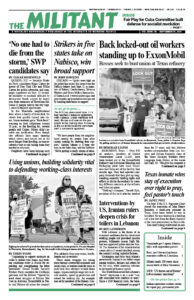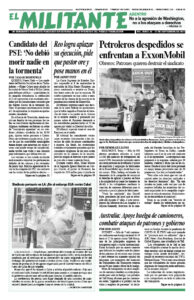With Lebanon in the throes of an economic meltdown that has devastated working people and provoked massive protests, billionaire tycoon Najib Mikati was appointed prime minister Sept. 10. The formation of his administration comes after a 13-month deadlock among the country’s ruling capitalist factions.
Washington and Paris back Mikati’s government, hoping it can deflect anger among workers, farmers and others hit by the crisis, while imposing solutions to the benefit of finance capital.
The World Bank noted that Lebanon’s “brutal” depression is on a scale “usually associated with conflicts or wars.” Since a 2019 financial crash, the banking system has collapsed and the value of the currency has fallen by 90%.
Unemployment and inflation have soared. Working people struggle to afford food or find medicines and wait in long lines to fuel up their cars. Over two-thirds of households can’t access clean water. The state electricity service provides barely two hours of power a day. Many small businesses have been forced to close.
After months of shortages of vital drugs, cancer patients and health care workers joined a Beirut protest Aug. 26 to demand the government ensure access to medicine and treatments.
Mikati is pushing the rulers’ “solution” — to end government subsidies on imported food, medicine and fuel. The International Monetary Fund has demanded savage cuts like this as the price to resume talks about new loans the government seeks.
Despite their rivalries for influence in the region, Washington and Paris joined with Tehran in backing Mikati’s government. Hezbollah, organized in predominantly Shiite neighborhoods, has a powerful militia armed by Tehran. Hezbollah and its allies dominate the government and hold the main ministries.
Two years ago working people and youth in Lebanon joined mass anti-government protests demanding jobs, a halt to government corruption and an end to Tehran’s interference.
Many protesters sought to get rid of the sectarian political setup imposed in 1990 at the end of a civil war there in which parties organized along religious lines — Shiites, Sunnis and Maronite Christians are allocated government posts and dispense political patronage. For example, the prime minister has to be a Sunni Muslim.
The aftermath of a huge explosion at a port warehouse Aug. 4, 2020, which killed over 200 people, injured thousands and leveled much of the Beirut waterfront, has become an additional focus of widespread anger toward ruling parties that covered up their responsibility for the disaster. Hezbollah uses Beirut’s ports and other civilian areas to store munitions it receives from Tehran.
Hezbollah fighters have been used by the Iranian rulers in their intervention in Syria, where their militias provided decisive military backing to the Bashar al-Assad regime after a popular uprising and civil war threatened to overturn his rule. One result is that over a million Syrian refugees are in Lebanon today.
Tehran seeks to extend its power against rival bourgeois Arab regimes and threatens to use its military clout to destroy Israel.
Druze villagers protest Hezbollah
After a Hezbollah rocket barrage against Israel drew retaliatory artillery fire Aug. 6, angry Druze villagers in Chouya, in southern Lebanon, stopped a Hezbollah truck mounted with rocket launch tubes, many empty after firing. They detained its crew, turning them over to the Lebanese army. Some protesters were heard on a video explaining, “Hezbollah is firing rockets from between homes so that Israel hits us back.”
Two days later Bechara Boutros al-Rahi, head of Lebanon’s Maronite Christians, called on the Lebanese army “to prevent the launching of missiles from Lebanese territory” for “the safety of Lebanon.”
Hassan Nasrallah, head of Hezbollah, announced Sept. 14 that to ease Lebanon’s crippling fuel shortages the first of several Iranian tankers had docked in Syria with oil en route for Lebanon. U.S. officials threatened to enforce sanctions against the Lebanese government and ship owners if they allowed tankers with oil from Iran to dock in Beirut. The U.S. government is counterposing a plan to transport Egyptian gas from Jordan through Syria to Lebanon.
Washington announced Sept. 7 it would funnel $47 million to prop up the Lebanese army. The U.S. rulers fear its collapse would create a void Hezbollah forces would rapidly fill, providing Tehran with even more openings to interfere in the country.
President Joseph Biden is seeking to reopen talks with the Iranian government over reviving a defunct agreement aimed at slowing down Tehran’s acquisition of nuclear weapons in exchange for lifting some of Washington’s sanctions. However, Tehran is pushing ahead with uranium enrichment, edging towards weapons-grade levels.

